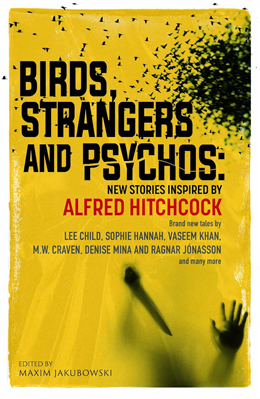With the continually diminishing short story marketplace, “Inspired By” anthologies remain all the rage in the crime fiction community. The latest to be released from the UK, Birds, Strangers, and Psychos, turns the focus in an obvious direction—the legendary works of Alfred Hitchcock. Maxim Jakubowski has assembled a first-class selection of contributors, and the resulting volume is easily one of the most successful examples of this type of collected anthology.
No doubt, using Alfred Hitchcock as a direct source of inspiration was a daunting task for these writers, but the stories they created proved they were more than up to the job. Across the twenty-four contributions, the quality ranges from really strong to exceptional—with the bulk of the stories appearing on the highest part of the scale. Loyal fans of crime fiction will not find that news surprising after seeing the list of participants in the table of contents. Names like Lee Child, Sophie Hannah, Denise Mina, Peter Lovesey, James Grady, Joe R. Lansdale appear next to newer superstars like S. A. Cosby, Ragnar Jónasson, Vaseem Khan, William Boyle, Peter Swanson, A. K. Benedict, and M. W. Craven. Among the other participants included are scriptwriters, journalists, critics, and even more writers who you will quickly add to your must-read list.
The stories in the collection approach the idea of “Inspired By” from multiple angles. There are stories like Peter Swanson’s “Strangers on a School Bus,” which cleverly transposes the original plot to a new location (and a younger demographic), to stories that feature Alfred Hitchcock himself as a character—like Lily Samson’s unforgettable “Hitchcock Blondes Have More Fun.” The tones range from very dark to almost comical across the anthology, making for an unpredictable reading journey. (I recommend reading the volume in the order of the TOC—something I rarely do with these types of collections—to experience the full effect of the choices made.)
Authors such as Sophie Hannah and M. W. Craven used their series characters in their short stories which adds a level of depth for pre-existing fans of those writers. The lengths of the stories also vary widely, which highlights the professionalism of the authors. S. A. Cosby’s “Split Your Silver Tongue” is one of the shorter works provided, but it’s the perfect length for the story at hand and the impact is elevated by the brevity. Conversely, “The Migratory Pattern of Birds” (M. W. Craven’s contribution) is almost novella length, but it never feels padded or overblown.
Another favorite was Peter Lovesey’s “Killing Hitch” which was written in script format (as if for an episode of Alfred Hitchcock Presents.) Surely one of the last works before Lovesey’s untimely passing, it’s a wonderful legacy for this talented wordsmith. In terms of building tension, Vaseem Khan’s “The Hunter” nails this Hitchcockian trope in another memorable storyline.
As one would expect, “Easter Eggs” abound throughout Birds, Strangers, and Psychos making it a delight for fans of the filmmakers oeuvre. All in all, there’s hardly a negative to this collection. With the holidays approaching, Birds, Strangers, and Psychos, would make a stellar gift for hard-to-buy-for crime fiction-loving friends and suspense film fanatical buffs alike. Just be sure to buy yourself a copy as well.

